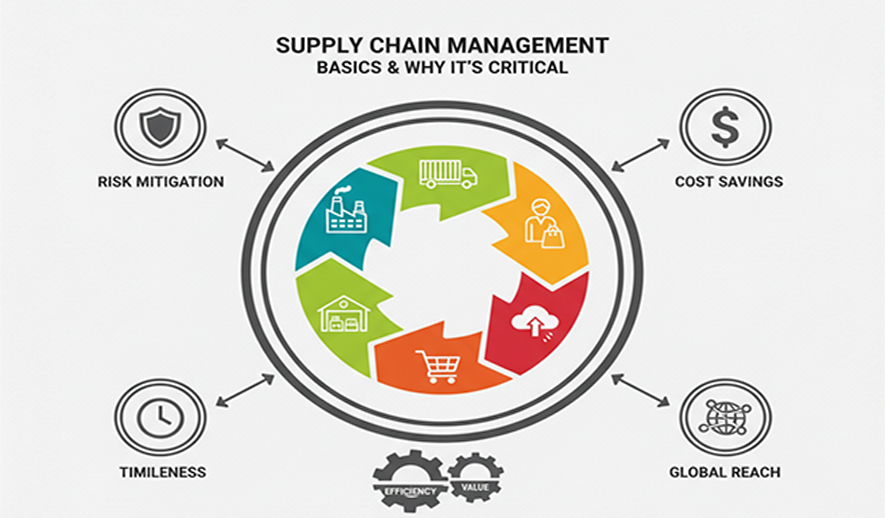
Supply Chain Management: Basics & Why It’s Critical
Supply Chain Management (SCM) is the coordination of all activities involved in the production and delivery of a product or service, from the sourcing of raw materials to its delivery to the end consumer. It is a strategic effort to optimize a company's operations and build a competitive advantage.
Basic components of SCM
The supply chain is a network of all the people, organizations, resources, and technology involved in creating and selling a product. While specific steps can vary by industry, the key components of effective SCM generally include:
- Planning: Creating a comprehensive strategy to manage all the resources needed to meet customer demand. This involves forecasting, budgeting, and establishing performance metrics.
- Sourcing: Selecting reliable suppliers and managing relationships to ensure a steady, cost-effective, and timely supply of raw materials and components.
- Manufacturing: The process of converting raw materials into finished goods. It includes production, assembly, quality control, and packaging.
- Delivery (Logistics): The transportation and distribution of finished products to customers through a network of warehouses and distribution centers.
- Returns (Reverse Logistics): Handling customer returns of defective, damaged, or unwanted products. An efficient return process is vital for customer satisfaction and managing waste.
Why SCM is critical
Effective SCM is essential for a business's success and for the broader economy. Critical SCM functions directly impact a company's profitability, resilience, and customer loyalty.
Benefits for businesses
- Optimizes efficiency and cuts costs: SCM streamlines operations by reducing waste, minimizing inventory holding costs, and optimizing transportation routes.
- Increases profitability and revenue: Lower operating costs and improved efficiency directly translate to higher profit margins. Better SCM also improves customer service, which helps drive repeat business and increase sales.
- Enhances customer satisfaction: By ensuring that products are delivered accurately, on time, and in good condition, effective SCM boosts customer loyalty and improves the overall customer experience.
- Builds resilience and agility: SCM helps companies anticipate and respond to supply chain risks, such as geopolitical issues, natural disasters, and unexpected changes in demand. A resilient supply chain can adapt to disruptions and maintain operational continuity.
- Provides a competitive advantage: Companies that effectively manage their supply chain can gain an edge over rivals by offering better service, lower prices, or faster delivery.
- Improves sustainability: Through initiatives like reducing fuel consumption, optimizing packaging, and managing returns efficiently, SCM helps companies lower their environmental impact.
